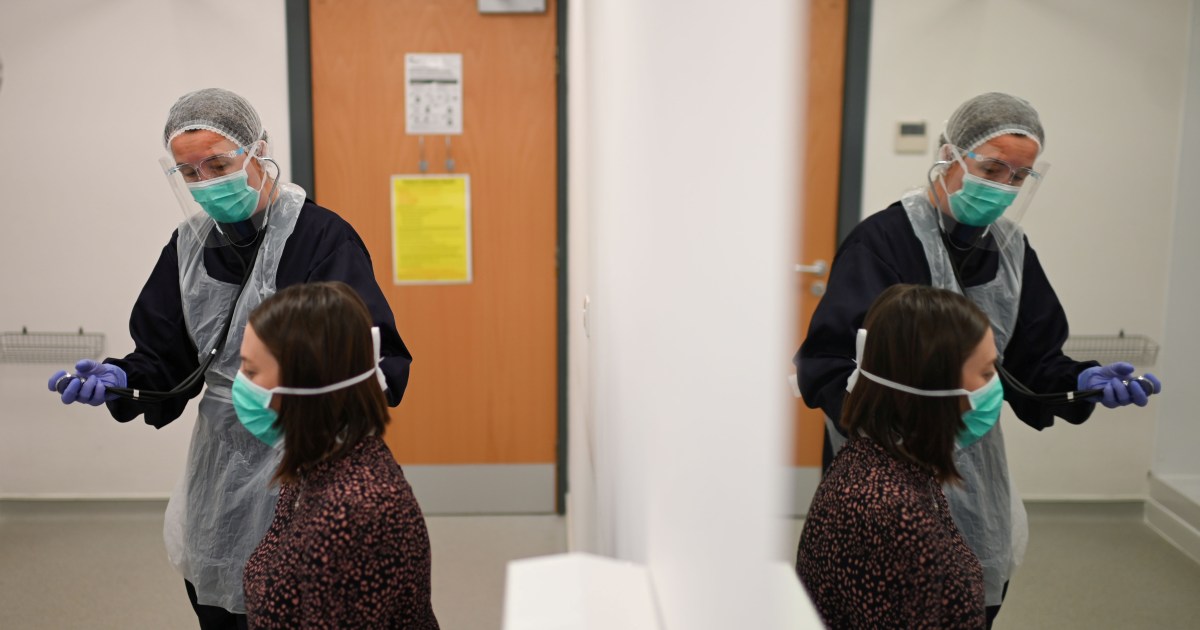Field hospitals that were built in the early days of the pandemic, but were later decommissioned, are being reactivated.
British doctors warned on Friday that hospitals across the country are facing some dangerous weeks amid the emergence of new coronavirus infections that have been attributed to a new variant of the virus.
A day after the UK recorded a record 55,892 new infections and another 964 coronavirus-related deaths, concerns over the effect on the overburdened National Health Service (NHS) are heightened.
Field hospitals that were built in the early days of the pandemic, but were later decommissioned, are being reactivated.
The director of the Royal College of Nursing in England, Mike Adams, told Sky News that the UK was in the “eye of the storm” and that it was “irritating” to see people not following the guidelines of social distance or wearing masks.
A senior doctor also warned of burnout among health professionals on the front lines of the outbreak in hospitals, while urging people to follow the rules.
“I’m concerned,” Adrian Boyle, vice president of the Royal College of Emergency Medicine, told the BBC. “We are very much in battle.”
New infections have more than doubled in recent weeks, after a new variant, said to be about 70% more contagious, was discovered behind a huge increase in cases in London and southeastern England.
Given the lag between new cases and hospitalizations and subsequent deaths, there are major concerns about the path of the pandemic in the next one or two months in a country that has the second highest number of virus-related deaths in Europe, almost 74,000.
As a result of the increase, which spread across the country and saw tightening restrictions, the strategy around vaccine distribution has been changed so that more people receive an initial injection as soon as possible, with a second scheduled postponed.
In a joint statement on Thursday, medical directors for England, Scotland, Wales and Northern Ireland said the first dose of the vaccine offers “substantial” protection.
Currently, two vaccines have been approved for use in the United Kingdom.
Just under a million people received the first dose of the vaccine developed by the American pharmaceutical company Pfizer and the German biotechnology company BioNTech, with a small minority also receiving the second dose as planned after 21 days.
Along with the approval earlier this week of the vaccine developed by the University of Oxford and the British pharmaceutical company AstraZeneca, a new dosage regimen has been devised, with the aim of providing a faster launch. This means that the second dose of both vaccines will occur 12 weeks after the first.
The four doctors said they were “confident” that the first dose of both vaccines would provide “substantial” protection.
“In the short term, the further increase in vaccine effectiveness from the second dose is likely to be modest; the vast majority of initial protection from clinical disease is after the first dose of the vaccine, ”they said.
The new plan has met with widespread criticism, with the UK’s leading doctors’ union warning that postponing the second dose causes huge problems for thousands of partially vaccinated seniors and vulnerable people.
“It is grossly and grossly unfair for tens of thousands of our most at risk patients to try to reschedule their appointments now,” said Richard Vautrey of the British Medical Association.
